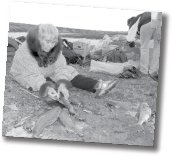What is a Theme Magazine?
A theme magazine is a written, audio or visual project which includes separate works
that all relate to a chosen theme. The individual works can be done by the literacy
group members and collected from other sources as well. The separate written, oral
or video pieces are formatted into an attractive format by the creators of the theme
magazine.
Ideas for Creating a Theme Magazine1
- You may decide to create a theme magazine based on your oral history
research.
- Small groups, pairs or individuals can work together to create their own theme
magazines. Or the whole literacy group could work together on one magazine.
- A theme magazine could be either a written production or an audio or video
production.
- Decide on the theme for each magazine, based on themes you noticed in
your oral history research. For example, your theme might be Elders’ Words
of Wisdom for the Future or When People Care, They Do Amazing Things or
Marriages Then and Now. (See Choosing the Theme of your Project in the Process
of Collecting Oral Histories section for more ideas.)
- Look at different types of magazines, such as Inuktitut magazine, The Beaver,
Up Here or Time, and listen to magazine-type TV or radio programs on APTN,
CBC North or southern TV channels. As a group, talk about the characteristics
of a theme magazine.
- There are many choices to include in a written magazine: articles explaining
an idea, a piece of persuasive writing, interviews, art, poetry, book and film
reviews, cartoons, photographs, legends or myths, advertisements. In an audio
or video magazine you could also include music and drama, as well. But all
the pieces should relate to the theme.
- You might review books, videos or other sources that you used in the research
phase.
- The creators of the magazine should write some of the material, but you can
add some that you collected from various other sources.
- The written theme magazines can be created on the computer or by hand; the
video magazines on videotape; and the audio magazines on audiotape.
- The facilitator teaches mini-lessons on the writing process, syllabic
keyboarding, grammar and any other topics as they come up. You could invite
people with special skills such as video producers or technicians from IBC in
to teach mini-lessons to the group.
- Throughout the writing and creation process people can get feedback through
peer consultation and editing.


